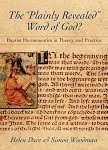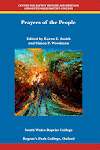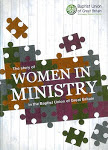‘God-in-the-box’
A sermon for
Provoking Faith in a Time of Isolation,
the online
gathering of Bloomsbury Central Baptist Church,
October 25th 2020
2 Samuel 7.1-17
Last Sunday
was our first Sunday service held in our church building, since the coronavirus
restrictions forced us to close our doors back in March.
And I think
it’s fair to say that, for the 17 of us who were able to be there, it was deeply
moving to be back in the sanctuary, even if the service itself was some way from
what we remember or desire.
I also hear
that those who joined online found it a good service, which is great, because we
will need to find ways of straddling the in-person / online divide for some time
to come.
And although
last week was a trial run, and unless we face further restrictions, we’ll be back
in our building for a service again in November.
And as I’ve
been reflecting on this experience during the week, what has struck me is the sense
I felt of ‘coming home’ to our building.
It was similar
to the feeling I get sometimes in a cathedral, that sense that God has been worshipped
in this place for so many years, and that this building has been a home for God’s
people for so long, that it somehow feels easier to enter God’s presence there compared
to, say, the street outside.
And it’s this
idea of building a ‘house’ for God, that lies at the heart of our reading this morning
from the second book of Samuel.
Here we find
one of the key turning points in the Hebrew Bible, the decision to build a temple
in Jerusalem.
In the end,
of course, it isn’t David who actually builds God’s house, it’s his son Solomon
who constructs the great first temple.
But Solomon’s
project is simply the fulfilment of the dream that we find articulated here by David,
who says to the prophet Nathan, "See now, I am living in a house of cedar,
but the ark of God stays in a tent."
And in this
one sentence, the whole history of religion shifts.
If we think
back on the story so far, we can trace an evolution in the way the ancient Israelites
thought about their God.
The original
revelation of God to Abraham was a moment of startling insight into the nature of
God.
Up until Abraham,
each nation, each tribe, each household, had their own gods.
There were thousands
of them, the god of the river who gave fish to eat, the god of the fields who gave
grain to grow, the god of the sky who caused rain and sun, the god of my tribe,
who helped me fight against your tribe, the god of my house, who I pray to every
night for safety and sleep, and so on, and so on, and so on…
And to Abraham,
God says that there is only one God, and that God is the Lord of the whole earth.
Abraham’s calling,
for him and his descendants, is to become the people who enter into a relationship
with that one true God, in order that all the earth might be blessed through their
witness to this new truth.
Fast forward
through Abraham, Isaac, Jacob, and Joseph, to God’s people in slavery in Egypt;
and here we come to the next milestone, which is the story of Moses and the exodus.
Through Moses,
God leads his people out of slavery, and into the wilderness, on their way to the
promised land.
Forget for a
minute the discussions about whether this all happened historically, because it
almost certainly didn’t.
But that’s not
the point.
This story of
Moses and the Exodus gives us a story of how God works in human history, it reveals
God as the liberator of the oppressed, and the enemy of empires.
And the image
of the people of God wandering in the wilderness is a timeless example of God’s
people in every age, with each generation making its pilgrimage from slavery to
promised land.
And as they
wander, as we wander, God travels with us - because God is the Lord of all the earth.
But then we
get to Mount Sinai, and the ten commandments, and things start to change gear, because
the people start to seek certainty and stability.
The big problem
with a big God is that we have very small lives, and we want to know what we should
do, how we should live.
So God gives
the Israelites the ten commandments, to guide them in their wandering and to help
them live well as the people of God’s covenant.
Except, of course,
it isn’t all that long before ten commandments become thousands, and you only have
to read through the books of Leviticus and Deuteronomy to see how, once you start
down the path of asking God for a rulebook, things get very complicated, very quickly.
And so the process
of tying God down continues, and the God of the whole earth becomes incrementally
that bit smaller, that bit more parochial, that bit more controllable.
By the time
we get to David, God is the God of Israel, who fights for them against the other
nations, who defends their borders, and asks of them obedience and faithfulness.
And so, for
David, the next logical step, is to build God a house.
There’s a bit
of clever word-play here, because David says he wants to build a house of God, by
which he means a temple, and God says he will build a house of David, by which he
means a dynasty.
And so, through
this, God gets a bit smaller again, becoming not even the God of Israel, but the
God of the southern tribes of Israel, as expressed through the temple in Jerusalem,
and David’s descendants as they rule in Jerusalem.
I told you this
was a significant moment in the history of world religions.
Here, in the
deal David does with God to build a house in exchange for a house, the great God
of all the earth glimpsed by Abraham, becomes a localised deity, focussed on one
city, and one family.
The Abrahamic
assertion that there is only one God, which revealed the presence of God in all
peoples and all places, becomes a diminished statement of territorial dominance,
denying the validity of other paths to the divine.
And so God gets
put in a box.
The ark of the
covenant containing the ten commandments, becomes the holy of holies at the heart
of a massive temple complex.
Only the high
priest can go there to see God, and then only once per year, everyone else is kept
at a distance.
The God who
travelled with the faithful through wilderness, the God who was with them in slavery,
the God who calls them to new life has become a God-in-a-box, in a bigger box called
the temple, in a bigger box called the city of Jerusalem, in a bigger box called
the nation of Israel.
And the family
that put him there, David’s dynasty, get to control God because the story they tell
of the deal David did, is one where God promises David an eternal kingdom, and a
throne for all time.
And so it might
have continued, except, of course, earthly dreams of perpetual power rarely run
smoothly.
After all, God
has already shown in Egypt that God is against all empires and it turns out that
this includes those empires that have been established in God’s own divine name.
God will not
stay in a box forever.
Eventually,
the temple is destroyed by the Babylonians, and the Davidic monarchy, the line of
David, loses its grip on power.
At which point,
the promises of God to David in this story go through a process of reinterpretation
and they become the hope of a future messiah, one who will re-establish the kingdom
of David, and restore the power to Israel that other nations have taken away.
Which is why,
when Luke tells the story of Gabriel’s appearance to Mary, he quotes from this text
to help his readers understand something profound about Jesus as the revelation
of God’s action in human history.
Luke 1.28, 30-33
28 And [Gabriel]
came to [Mary] and said, "Greetings, favored one! The Lord is with you."
30 The angel said to her, "Do not be afraid, Mary, for you have
found favor with God. 31 And now, you will
conceive in your womb and bear a son, and you will name him Jesus. 32 He will be great, and will be called
the Son of the Most High, and the Lord God will give to him the throne of his ancestor
David. 33 He will reign over the
house of Jacob forever, and of his kingdom there will be no end."
All the messianic
hopes of David’s kingdom are put onto Jesus at his incarnation.
And then Jesus
spends the rest of his life subverting them.
Jesus may be,
within the Christian tradition, the fulfilment of messianic hope, but it’s a different
form of Jesus consistently refuses to raise an army, he turns away from those
who would enact a revolution in his name, he resists the title ‘son of David’, always
calling himself simply ‘the son of man’.
Jesus refuses
to seek a palace, instead claiming that ‘the son of man has nowhere to lay his head’
(Lk 9.58).
He never marries,
he has no children.
The God revealed
in Jesus doesn’t want a ‘house’ either in terms of a building, or a dynasty.
Instead, Jesus
constantly takes people back to Abraham’s original vision of God, as the universal
Lord of all creation confounding those who would use him to rebuild David’s lost
lineage of power.
Jesus will not
be put in a box.
So, my question
for us this morning is this: what boxes do we put God in?
Do we try to
build temples for our God? Why is our worship space, with its pews and stained glass
windows, called the ‘sanctuary’? Why was I moved to tears last Sunday when we worshipped
there again?
Do we seek to
constrain God to certain worship styles, or favoured theologies?
Is God the God
of us, and our people, but not the God of them, and their people?
Do we seek to
constrain God’s action in our own lives, seeking settled status within ourselves
instead of embracing a life of wilderness pilgrimage?
If so, then
we need to beware, because God will not be constrained, and neither will God live
in a box.
God is the God
of the whole earth, and through Jesus and by the Spirit of Christ we are called
to a vision of God that is bigger and more universal and more loving than we can
ever conceive.
The eternal
kingdom, that enfolds and embraces us all, is the kingdom of God.
And we build other empires at our peril.















